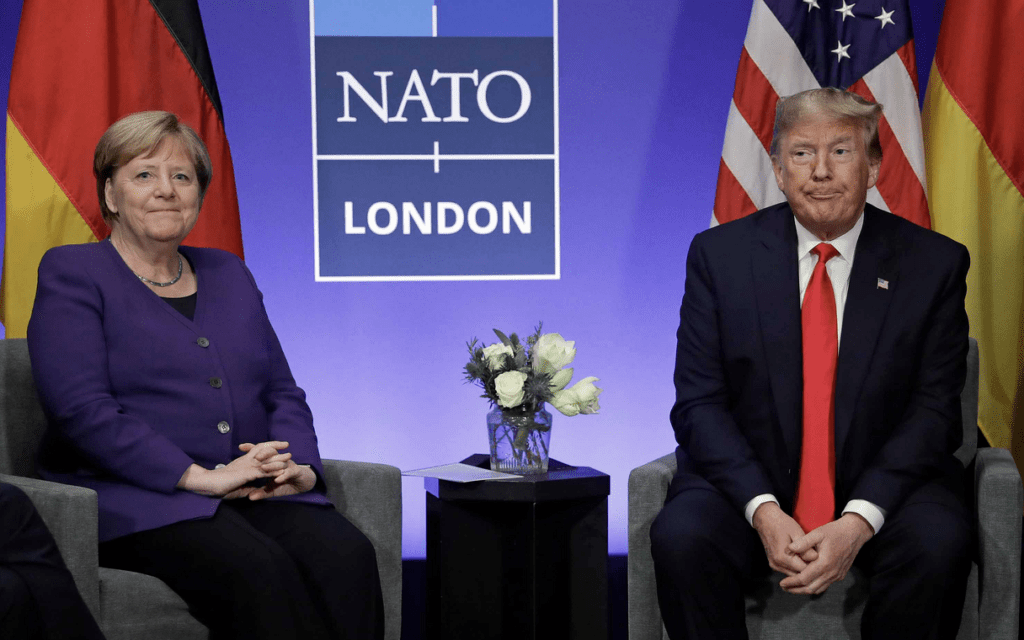NATO and the Intelligence Technology Complex

Lisa Van Dusen/For the Hill Times
December 5, 2019
When the North Atlantic Treaty Organization marked its golden anniversary in Washington 20 years ago, there was bickering, but it was mostly behind the scenes at the Ronald Reagan Building and at the nearby Willard Hotel, among surrogates still un-nannied by smartphones.
At the time, in April 1999, the NATO bombing of Yugoslavia over Slobodan Milosevic’s ethnic cleansing of Kosovo Muslims had been underway for a month. British Prime Minister Tony Blair was agitating for ground troops and U.S. President Bill Clinton remained balky based on the post-Vietnam political inhibitor known as the bodybag factor, which wasn’t mothballed until two years later, on September 11, 2001. At the NATO 50th, the tension was palpable. (I was desking it for UPI).
But that was nothing, apparently, compared to the vibe at NATO’s 70th anniversary currently underway in Watford, U.K., and billed by The Guardian’s Simon Tisdall as the “birthday party from hell.”
In a content drop of punkish irony at a time when history’s most powerful military alliance is being outgunned by the industrialized BS of narrative warfare, French President Emmanuel Macron set the scene in an Economist interview two weeks ago in which he described NATO as “brain-dead.” President Recep Tayyip Erdogan of Turkey helpfully refreshed the headline days before the party. “These statements are suitable only to people like you who are in a state of brain death,” Erdogan said of Macron.
All of this—the chaos, the rhetorical toddlerism, the apocalyptic expectations—is, of course, enabled by the presidency of Donald Trump, who has leveraged his own neurological idiosyncrasies to render possible what, previously, would never have even been plausible. That includes Trump’s status as the first American president to normalize the undermining of NATO by pining publicly for its demise long before Macron’s diagnosis.
Standing by his comments last week and demanding a review of strategic priorities, Macron identified NATO’s problem with a question: “Who’s the enemy?”
Wars are now waged with smoke-screening propaganda and misrepresentation of intent, affiliation, and interest and ‘won’ based on democracy-degrading outcomes achieved without fingerprints traced or true stakes declared.
Since the preamble to the North Atlantic Treaty states that its signatories’ role is to “safeguard the freedom of their peoples,” “founded on the principles of democracy, individual liberty and the rule of law,” the enemy would presumably be any leader, nation, group, or organization that poses a threat to those principles. At this point, that list includes parties both present in Watford and listening at a distance. NATO’s value at the moment is most clearly quantified by the apparently immeasurable value of its nonexistence to those parties.
Like so many multilateral institutions of the liberal world order, NATO was blindsided by a revolution that was just beginning to register its impact 20 years ago, when the alliance was still fighting over bombs vs. boots. Since then, the military industrial complex Dwight Eisenhower warned about has been replaced by a more insidious intelligence technology complex. Wars are now waged with smoke-screening propaganda and misrepresentation of intent, affiliation, and interest and “won” based on democracy-degrading outcomes achieved without fingerprints traced or true stakes declared.
America’s degradation under Trump has been secured without a shot being fired or a bomb being dropped. Brexit will decimate Britain’s economy and squander its influence without an annexation, occupation, or blitz. China has, for two decades, built the economic heft that has enabled its expansionism, belligerence, and anti-democracy activities by cyberpoaching intellectual property while Western intelligence agencies, by their own account, were “sleeping.” How do you invoke NATO’s Article 5 on collective defence against a borderless onslaught of weaponized corruption and tactical deception?
NATO isn’t brain-dead. Democracy, individual liberty, and the rule of law are all under attack, which is why the institutions defending them—including a free press and unadulterated elections—have become targets. It’s the enemy, and the weapons, that aren’t what they used to be.
Policy Magazine Associate Editor and Deputy Publisher Lisa Van Dusen was a senior writer at Maclean’s, Washington columnist for the Ottawa Citizen and Sun Media, international writer for Peter Jennings at ABC News and an editor at AP National in New York and UPI in Washington.
